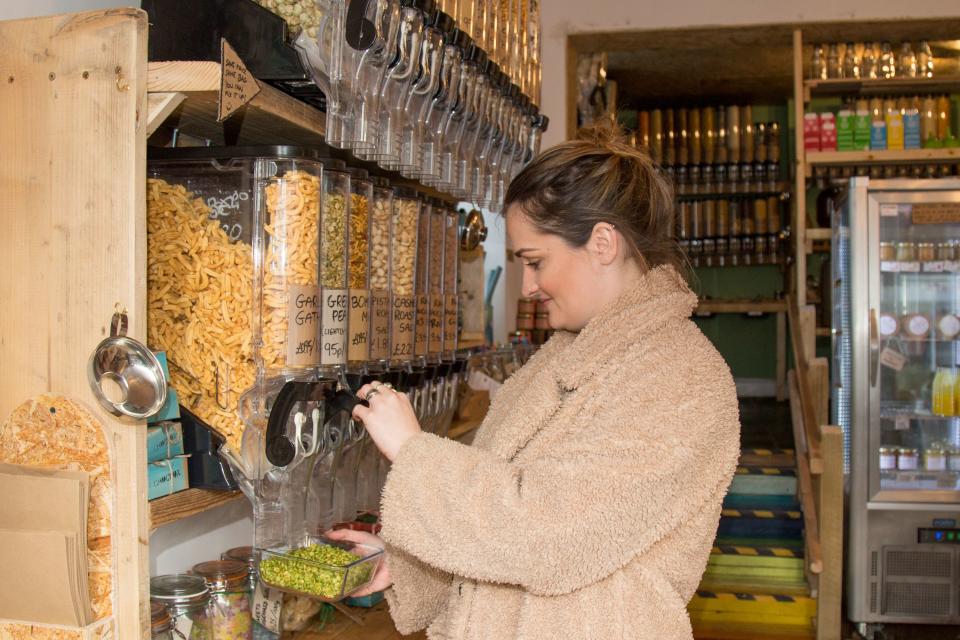Majority of Britons support refill points to cut plastic waste, survey suggests
More than 80% of Britons want the Government to make refillable products a central part of its strategy for tackling the plastic pollution crisis, according to a survey.
Released on World Refill Day, the research found more than two-thirds (73%) of respondents think plastic pollution is as bad or worse than it was before the onset of the pandemic.
A third have had a reusable container such as a coffee cup rejected in the last 12 months, despite guidance stating they are Covid-safe for servers to handle as long as basic hygiene practice is followed.
The survey of 2,000 adults conducted in May this year found 80% were taking steps to reduce their consumption of single-use plastic.

Commissioned by Friends of the Earth and anti-plastic pollution charity City to Sea, the research found 81% wanted the Government to prioritise making refillable products more widely available.
It found 74% would like to see more refill options for items such as dried foods, laundry detergents and take-away coffee.
Three in four reported feelings of “anxiety, frustration or hopelessness” at the amount of plastic packaging that comes with their shopping.
More than half of those surveyed (55%) think supermarkets and big name brands are not doing enough to address plastic pollution.

A further 59% said supermarkets were not offering enough refillable, reusable or packaging-free products.
World Refill Day, a campaign set up by City to Sea, aims to prevent plastic pollution by helping people live with less waste by making small changes to their everyday shopping.
It directs people to businesses offering refill and reuse options on their goods via the Refill app, which has 200,000 refill stations logged globally.
City to Sea and Friends of the Earth are calling on the Government to make refill and reuse a central plank of the post-pandemic recovery, as well as introducing legally binding targets on plastic pollution.
They are also calling on retailers to make it easier for customers to make plastic-free choices by introducing refillable products and creating packaging-free aisles.
The two organisations want to see similar plans to those proposed in France, where 20% of shelf space would be dedicated to refill stations by 2030.

Jo Morley, City to Sea’s head of campaigns, said: “These latest figures support what organisations like City to Sea and Friends of the Earth have been long saying – we need nothing short of a refill revolution.”
She continued: “This is about putting action behind the words that have long been promised to implement the waste hierarchy that clearly puts recycling as a last resort after all efforts to reduce, reuse and refill have been exhausted.
“As a global movement, we have the power to create a wave of change and show businesses, brands and governments that we still want to see action on plastic and reuse is the solution.”
Friends of the Earth plastics campaigner Camilla Zerr said: “The results are in and couldn’t be clearer – public support for a world where plastic pollution isn’t choking our oceans, landscapes and wildlife is resounding.
“But so far, Government promises on plastic have been all bluff and bluster, with little guarantee of a real reduction in plastic pollution.”
She continued: “There is now a fantastic opportunity to craft a new, ambitious vision for plastic pollution enshrined in law through the Environment Bill.
“The Government should use it to really listen to what the public wants and put reuse and refill at the heart of this much-needed legislation.”
A Department for Environment, Food and Rural Affairs (Defra) spokesperson said: “The UK is a global leader in tackling plastic pollution. Recycling and reusing more of our waste is key to leaving the environment in a better state for future generations.
“We welcome refill initiatives and want companies to take more responsibility for their packaging waste, with consumers incentivised to reuse and recycle the billions of drinks bottles and cans purchased every year.
“That’s why we have brought forward our landmark proposals for packaging reform and a deposit return scheme, which will boost recycling, step up our war on plastic pollution and reduce litter in our communities and countryside.”

 Yahoo Movies
Yahoo Movies 
